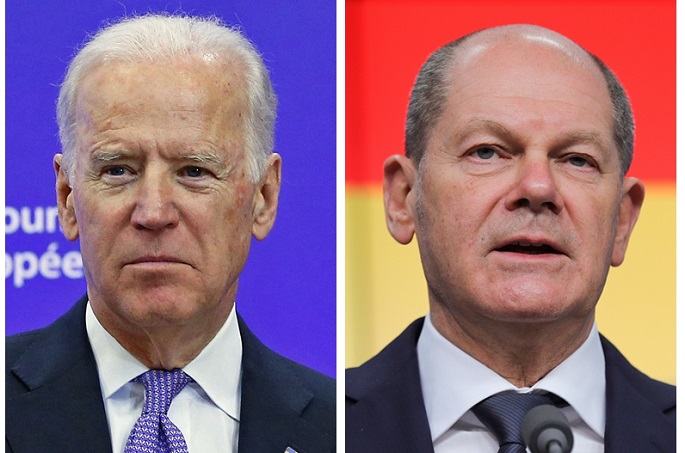Risk of Russian 'aggression' remains, say Biden and Scholz
Published : 17 Feb 2022, 23:51
The risk of a Russian 'aggression' against Ukraine remains, German Chancellor Olaf Scholz and US President Joe Biden said after a long telephone call on Wednesday, reported dpa.
The two leaders agreed that the situation in the region should be considered extremely serious in view of the massive Russian troop deployment in the border area with Ukraine, German government spokesman Steffen Hebestreit said.
The leaders agreed that a significant withdrawal of Russian troops had not been observed so far, and the highest level of vigilance was required, he added.
The White House said that Biden and Scholz "reaffirmed their commitment to Ukraine's sovereignty and territorial integrity and underscored the importance of continued transatlantic coordination on diplomacy and deterrence measures and the reinforcement of NATO's eastern flank if Russia further invades Ukraine."
Ukrainian President Volodymyr Zelensky also said he sees no sign that Russia is withdrawing its forces from the Ukrainian border area.
"We are seeing small rotations. I would not call these rotations the withdrawal of forces by Russia," he told a public broadcaster. It is still too early to rejoice, he said.
NATO on Wednesday dismissed Russia's claims to be pulling back soldiers from the Ukrainian border area and announced plans to possibly station allied troops in south-eastern Europe - a move liable to draw the ire of Moscow.
Despite assertions to the contrary "it appears that Russia continues the military build-up," NATO Secretary General Jens Stoltenberg told reporters in Brussels. "What we see is that they have increased the number of troops and more troops are on their way."
Russia first indicated on Tuesday it would decrease its presence in the areas near Ukraine, where it has amassed troops - well over 100,000 according to NATO - and equipment in recent weeks, prompting fears over a potential invasion.
On Wednesday, the Russian Defence Ministry said several units involved in manoeuvres on the Black Sea peninsula of Crimea, annexed from Ukraine by Russia in 2014, have now returned to their bases after finishing exercises.
State news agency Ria Novosti released a video showing a platoon of tanks and other military vehicles travelling in darkness over the Crimean Bridge that connects the peninsula to mainland Russia.
Stoltenberg dismissed this as proof of a serious, sustained withdrawal, echoing sentiments voiced by various Western leaders. Kremlin spokesperson Dmitry Peskov hit back, saying there were "problems" with NATO's analysis.
Moscow, which has backed pro-Russian separatists in eastern Ukraine since 2014, claims it has no designs on an invasion.
Still, Moscow's troop announcements have raised a slight glimmer of hope that the crisis along Ukraine's border could be easing after weeks of intense diplomacy and threats by the West of punishing sanctions.
Stoltenberg said that Russia being willing to engage in diplomacy was grounds for "cautious optimism."
But scepticism about the announced withdrawal remains high. Ukraine, the US, European powers and NATO all suggest they will not take Russia's claims to be pulling back at face value and need independent confirmation.
Meanwhile, other manoeuvres that have caused alarm continue, such as Russian military exercises in Belarus, which also borders Ukraine.
Ukraine is not part of NATO - and therefore not protected by its mutual defence pact - but aspires to join. Russia fiercely opposes yet another of its neighbours joining the alliance.
NATO allies have been sending more ships, fighter jets and troops into Eastern Europe and putting other soldiers on standby. Ukraine has also received several hundred tons of weapons and ammunition from NATO countries.
Following Moscow's 2014 Crimean annexation, NATO deployed four battle groups of multinational forces in Estonia, Lithuania, Latvia and Poland, which have received reinforcement of late.
Defence ministers decided on Wednesday to consider setting up new battlegroups on its Russian-facing south-eastern flank, despite demands from Moscow to reverse the eastward expansion. France has already offered to lead a new battlegroup in Romania.
Military commanders would work on the details and report back in the weeks to come, Stoltenberg said, stressing that no decision had yet been taken.
Even if Russia were to step down now, recent events show NATO must consider long-term changes to its distribution of forces in Europe, the alliance chief said. Some NATO members that border Russia or Ukraine feel threatened.
German Defence Minister Christine Lambrecht said a decision on permanent adjustments should be made "not in this current situation," but in a few months "after an intensive examination and scrutiny of the situation at that time."
Meanwhile, Ukraine marked a "day of unity" on Wednesday. Zelensky declared the occasion earlier this week after reports in US media cited February 16 as a day Russia could launch an attack.
State employees were obliged to sing the anthem and classes were suspended in schools across the country. Television stations were set to broadcast special programmes in the morning and afternoon.
Zelensky visited troops conducting military drills near the north-western city of Rivne, his office announced.
Fighter jets, combat drones, artillery, multiple rocket launchers and anti-tank missiles were used in the exercises, according to the statement. Some of the weaponry had been provided recently by Kiev's Western allies.
Ukrainian government forces have been battling the pro-Russian separatist forces that control the Donbas area of Ukraine's east for some eight years. According to UN estimates, about 13,000 people have died there since the conflict began.


